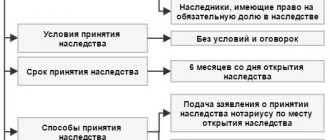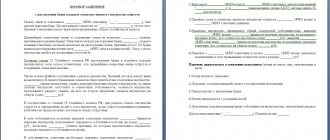Regulatory regulation of inheritance by law
According to the provisions of the Civil Code of the Russian Federation, all movable and immovable property of the deceased, as well as property rights, are transferred to the disposal of representatives of the first line of inheritance. If there are none, to relatives from subsequent stages (second, third, etc.), provided that its owner did not express his will regarding the distribution of his property among his relatives and people close to him until the moment of death.
The procedure for distributing objects that are components of the inheritance mass among the legal heirs is determined and regulated by Articles 63 of Chapter of the Civil Code.
Interpretation of the concept of heirs of subsequent queues
The Civil Code of the Russian Federation contains this concept, which is disclosed in the comments to Art. 1145 of the same legal act.
Current civil legislation, in particular the institution of inheritance, is primarily based on the principles of private Roman law. Thus, determining the degree of relationship between the testator and his descendants depends on the number of generations. The modern Civil Code of the Russian Federation provides a similar rule for determining kinship by counting the number of births that occurred after the birth of the testator himself and before the birth of the heir, the degree of kinship of which is to be established.
The presence of seven lines of inheritance is a novelty in the modern Civil Code, since previous versions of this act of lawmaking did not contain more than 4 levels.
Expanding the circle of persons by adding inheritance lines indicates the strengthening of the property rights of citizens, in particular one of the basic constitutional principles of the inviolability of private property.
Basic rights of persons who are heirs of subsequent orders
The order of acceptance of an inheritance is the sequence established by the legislator according to which the inheritance is transferred from the deceased owner to his relatives in the absence of a will. If the heirs of the first priority for some reason do not exercise their right within the allotted period, the property and property rights of the deceased person are transferred to representatives of the next priority (from the first to the second, from the second to the third, from the fifth to the sixth, etc.). d.).
The exercise of the right to inheritance by at least one person from the previous line deprives representatives of subsequent lines of the opportunity to receive inherited property or part of it, since the distribution of objects of the hereditary mass between relatives from different levels of inheritance is not provided for by law.
Among representatives of the same level of order, the hereditary mass is distributed in equal shares.
Consequences of declaring an heir unworthy
The part of the inheritance that would have been due to an unworthy heir passes to the heirs by law called to inherit, in proportion to their inheritance shares. However, if the testator bequeathed all the property to the heirs appointed by him, then the part of the inheritance due to the unworthy heir passes to the remaining heirs under the will in proportion to their inheritance shares, unless the will provides for a different distribution of this part of the inheritance (clause 1 of Article 1161 of the Civil Code of the Russian Federation).
An unworthy heir who has accepted an inheritance is obliged to return all property that he unjustifiably received from the inheritance (clause 3 of Article 1117 of the Civil Code of the Russian Federation).
#presidential grants fund #potanin fund #spiritualmoscow #right #disabled people #barrier-free
#inheritance #heirs
Conditions for the transfer of the right to inheritance to representatives of subsequent orders
According to the law, the right to receive an inheritance passes to representatives of the next line under the following conditions:
- there are no heirs in the previous line. This is possible in the event of the death of these persons or their absence;
- representatives of the previous level of inheritance are deprived of the right to inheritance by the testator himself or on the basis of law;
- there is a refusal to enter into the inheritance or its non-acceptance. In the first case, the heirs of the previous priority renounce the property and property rights of the deceased by drawing up a corresponding application, which does not indicate the person in whose favor the refusal was made. The second case assumes the absence of any statements from the heirs of the previous line indicating the latter’s intentions to enter into the right of inheritance or to renounce it altogether.
What rights do they have?
- They will be able to receive their share of the property only if none of the relatives presented in the first place demands it.
- They can either divide all property into equal shares or create their own list of things for each.
- If there is only one heir in the second stage, he receives all rights to the inheritance.
- Anyone can renounce their share of the inheritance and write a refusal at the notary office.
- They can prove their relationship with the deceased by providing relevant documents, personal correspondence or by going to court.
- They can claim a larger share than other heirs if they are disabled dependents and are included in the eighth line.
- They can declare their desire to receive an inheritance within six months after the date of death of a relative.
Establishing the degree of relationship of heirs
Degrees of relationship are established between the testator and heirs related to the deceased by blood or marriage. The exception is the circle of persons whom the legislator classified as heirs of the seventh priority, since there are no blood or marriage ties between the testator and representatives of the seventh level of priority.
The procedure and conditions for changing the order of heirs belonging to different degrees of kinship are established by law.
Thus, in the absence of representatives of the first degree of kinship, the testator’s property passes to the persons of the second degree of kinship, and if the latter do not accept the inheritance, to the heirs of subsequent orders.
To establish the degree of relationship, it is necessary to count the number of births separating the testator and the heir. In this case, the fact of birth of the owner of the property is not taken into account. For example, one birth (of a son) occurred between a father and son, so the latter is a relative of the first degree of kinship and, accordingly, is included in the circle of persons in the first line of inheritance.
Violation of the established procedure for determining the degree of kinship is allowed in cases of entry into inheritance by right of representation, when the previous degree of kinship includes the heirs of a person who was unable to exercise his right due to death that occurred before the opening of the inheritance or simultaneously with this event.
Persons who are heirs by right of representation
According to the law, if before the opening of the inheritance or immediately at the time of the death of the testator, one of the heirs of the first degree of kinship dies, the opportunity to receive the inheritance or part of it passes to the descendants by right of representation, while the general rule of priority is observed.
Most often, inheritance by right of representation occurs when relatives of the first degree (father and son or daughter) die at the same time, say, during a car accident or under other tragic circumstances. Then the children of the deceased heir of the first degree of kinship, who were grandchildren of the testator, enter into the inheritance by right of representation.
According to the law, in order to enter into an inheritance by right of representation, in addition to documents confirming the death of the main testator, the applicant for receiving property must provide a death certificate of the person whose right to inherit has passed to him.
Right of representation
The right of representation is a special type of inheritance by law (precisely by law, and not by will!), which involves the transfer of an inheritance share from an heir who died before the opening of the inheritance to his descendants.
Heirs by right of representation are divided into 3 stages. Let's talk about the first two:
1
The first priority includes the closest family members : parents, children and spouse. They have the main right to divide the inheritance among themselves (Article 1142 of the Civil Code of the Russian Federation).
It is worth noting that when dividing property, they have completely equal rights and receive equal shares, unless they independently agree on a different procedure for distributing property. Read about how to correctly draw up an inheritance division agreement here.
If none of these people are alive or they renounce their rights to property, then their descendants, that is, grandchildren and granddaughters, can use them. This will be inheritance by right of representation.
If all the listed persons are dead or have written a refusal to receive the inheritance, then the right to it passes to the representatives of the second priority.
2
The second priority includes brothers and sisters and grandparents of the deceased (Article 1143 of the Civil Code of the Russian Federation). To obtain the right to property, they are required to provide evidence of family ties with the deceased.
Sisters and brothers can be full-blooded or half-blooded; their final share of the acquired property does not depend on this.
- Full siblings are completely connected by family and blood ties, that is, they have a common mother and father.
- Half-parents have only one common parent, and for the law it does not matter whether it is mother or father.
Grandparents will receive the property of the deceased only if they are blood relatives (by mother or father). If the deceased was adopted, then the parents will not receive anything (except in cases of official adoption).
Important! There are also half-brothers and sisters. They are not related by blood in any way, since their parents got married after their birth and are not entitled to second-degree inheritance.
Representatives of the first and third stages
The circle of persons who are heirs of the first to third line of inheritance is enshrined in civil legislation. According to the requirements of legal norms, the first applicants to receive the property and property rights of a deceased person are relatives of the first degree, namely:
- husband (wife) who survived the deceased spouse;
- natural and adopted daughters and sons;
- parents of the deceased.
The second stage includes the grandfather and grandmother of the deceased, his sisters and brothers, as well as the children of the latter.
In the absence of such, the property passes to their relatives by right of representation.
Uncles and aunts of the deceased, both full and half, both maternal and paternal, belong to the third stage of inheritance.
How is property distributed?
According to Article 1141 of the Civil Code of the Russian Federation, if the deceased has not written down his wishes regarding the further distribution of his property in a special document (will), inheritance occurs in the order of priority.
There are eight queues in total , where close and distant relatives are arranged in descending order of their relationship.
Most often, all property goes to the people who are in the first of them, but it may be different.
Persons who are heirs of subsequent orders
1. Heirs of the fourth stage
The circle of persons at this level of inheritance is represented by relatives of the third degree of kinship, namely the great-grandmother and great-grandfather of the deceased owner of the property.
2. Heirs of the fifth stage
The fifth stage includes cousins:
- cousins, granddaughters;
- great-uncles, grandmothers.
In other words, at the fifth level the legislator placed the sister and brother of the grandparents, who are the parents of the testator’s mother and father. Also included in the fifth stage are the sons and daughters of the children of the siblings of the deceased owner of the property.
3. Heirs of the sixth stage
Unlike the fifth and previous stages, the sixth level of heirs is represented by more distant relatives, namely:
- grandchildren of the testator's siblings;
- grandchildren of the testator's aunts and uncles;
- cousins and brothers of mother and father.
4. Heirs of the seventh line
A separate category can be identified for applicants of the seventh stage, who are fundamentally different from the circle of people from the sixth, fifth, and other previous stages.
The difference lies in the absence of blood and marital ties between them and the testator.
So, if there are no heirs of the first – sixth stages, the property passes to the disposal of the following persons:
- actual educators of the testator (stepfather, stepmother);
- stepson;
- stepdaughter.
The procedure for distributing inherited property between heirs
According to the law, the inheritance is distributed equally among the applicants for its receipt.
However, one important fact should be taken into account whether the inherited property was the private property of the deceased person, purchased by him before marriage, or community property acquired during the marriage.
In the first case, as a rule, no problems arise, since all persons who are heirs receive equal shares. As for the second situation, here it is necessary to first allocate part of the second spouse, and this is ½ of the common property. The remainder is divided equally among first-degree relatives. As a result, under such circumstances, the spouse receives 2/3 of the property, children - 1/6, parents - 1/6.
If, for example, the son of the testator died shortly before the death of the latter or at the same time as him, his share passes to his heirs of first priority by right of representation. In this case, this will be the spouse of the main testator, who is the mother of the deceased heir of the first stage, his children and wife (husband).
Another 1/18 of the inherited property is added to the share of the wife of the main testator. As the owner of the largest share, the most suitable option is for the testator's spouse to pay the remaining heirs the value of their share (especially if we are talking about one piece of real estate).
Author of the article
Who can count on the obligatory share?
In order to take care of the maintenance and well-being of certain groups of the population, the state provides special provisions for their inheritance of property (Article 1149 of the Civil Code of the Russian Federation).
There is a list of mandatory heirs:
- children under 18 years of age or disabled (including adopted children).
- A spouse who is unable to provide for himself and was dependent on the testator during his lifetime.
- Parents of the deceased (including if they adopted him).
- Dependents (people who, due to certain circumstances, cannot earn a living, lived with the deceased, and it does not matter whether they are relatives).
The listed persons are entitled to a part of the inheritance, regardless of whether there was a will or not.
Also, objections of relatives in disputes over property rights are not accepted by these persons. They must be provided with an inheritance in any case. Their share should be at least half of what they could have received without a will (Article 1148 of the Civil Code of the Russian Federation).
Moreover, when inheriting living space (or any real or movable property), if a person had the right to own it during the life of the testator, this right is retained by him. And the inherited share does not become smaller because of this. The heir can accept the property on all grounds , on several grounds, or on one of them in accordance with his desire.
At the same time, another heir under the will used this property: he permanently lived in it or used it as the main source of income. Then the obligatory heir, taking into account his financial capabilities, may be deprived of the rights to his share (or part thereof).
Important! There are cases when a person inherits property (or a part of it) through compulsory share, which he did not use until that moment or did not even know about its existence.
We talked in more detail about who has the right to inheritance by law and will, and here you will learn about the peculiarities of the procedure for dividing property in such cases.









